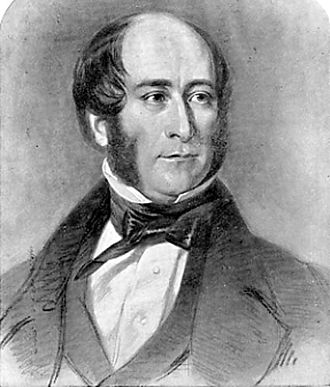The anthem was "The Lord Hath Been Mindful Of Us" from "Ascribe Unto The Lord" by Samuel Wesley
This is the final part of Ascribe unto the Lord which is a setting of Psalm 96, verses 7-10, 2, 3 and 5 and Psalm 115, verses 4-8, 3,and 12-15.
The LORD hath been mindful of us: he will bless us; he will bless the house of Israel; he will bless the house of Aaron.
He will bless them that fear the LORD, both small and great.
The LORD shall increase you more and more, you and your children.
Ye are blessed of the LORD which made heaven and earth.
Samuel Sebastian Wesley (1810 - 1876) was the illegitimate son of Samuel Wesley and Sarah Souter, and grandchild of Charles Wesley.
After singing in the choir of the Chapel Royal as a boy, Samuel Sebastian embarked on a career as a musician, and was appointed organist at Hereford Cathedral in 1832. While there he married the sister of the Dean, John Merryweather. S.S. Wesley was, like his father Samuel Wesley, a Freemason. He was initiated in Palladian Lodge No.120 in Hereford on 17 September 1833. He moved to Exeter Cathedral three years later, and joined St George's Lodge No.129 Exeter on 10 December 1835. He subsequently held appointments at Leeds Parish Church (now Leeds Minster) (from 1842), Winchester Cathedral (from 1849), Winchester College and Gloucester Cathedral (1865-1876). In 1839 he received both his Bachelor of Music degree and a Doctor of Music degree from Oxford. He became a Professor of Organ at the Royal Academy of Music in 1850. He died at his home in Gloucester on 19 April 1876 aged 65. He is buried next to his daughter in St. Bartholomew's Cemetery in Exeter by the old City Wall. There are memorial tablets to him in Exeter Cathedral and Winchester Cathedral, and his memorial at Gloucester Cathedral is in stained glass.
Famous in his lifetime as one of his country's leading organists and choirmasters, he composed almost exclusively for the Church of England, which continues to cherish his memory. His better-known anthems include Thou wilt keep him in perfect peace and Wash me throughly. He also wrote several rather late examples of verse anthems, which contrast unison and contrapuntal sections with smaller, more intimate passages for solo voice or voices. Blessed be the God and Father, The Wilderness and Ascribe unto the Lord are of considerable length, as is his Service in E.
The popular short anthem Lead me, Lord is an extract from Praise the Lord, O my soul. Several of his pieces for solo organ have enduring value and continue to be played in recitals now and then.
Of his hymn tunes the best-known are "Aurelia" and "Hereford." "Aurelia" has been widely adopted in the United States, and is regularly heard there. Usually now sung to the words "The Church's One Foundation", Wesley composed the tune for the hymn "Jerusalem the Golden", hence the name "Aurelia".
One notable feature of his career is his aversion to equal temperament, an aversion which he kept for decades after this tuning method had been accepted on the Continent and even in most of England. Such distaste did not stop him from substantial use of chromaticism in several of his published compositions.
While at Winchester Cathedral Wesley was largely responsible for the Cathedral's acquisition in 1854 of the Father Willis organ which had been exhibited at The Great Exhibition, 1851. The success of the Exhibition organ led directly to the award of the contract to Willis for a 100-stop organ for St George's Hall, Liverpool built in 1855. Wesley was the consultant for this major and important project, but the organ was, arguably, impaired for some years by Wesley's insistence that it be tuned to unequal temperament.
Wesley, with Father Willis, can be credited with the invention of the concave and radiating organ pedalboard, but demurred when Willis proposed that it should be known as the "Wesley-Willis" pedalboard. However, their joint conception has been largely adopted as an international standard for organs throughout the English-speaking world and those exported elsewhere.
Samuel Sebastian Wesley picture and words taken from Wikipedia

No comments:
Post a Comment